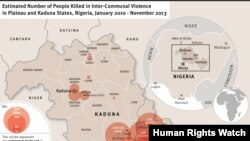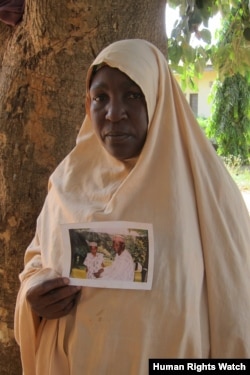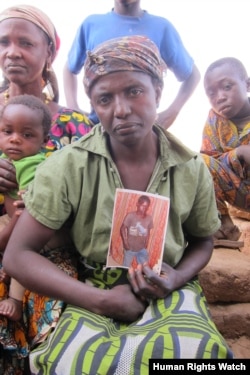ABUJA —
A new report by Human Rights Watch says thousands of people have been killed in inter-communal violence in Nigeria’s “Middle Belt” during the past four years and almost none of the killers have been prosecuted. In Abuja, locals say without justice, the violence will only get worse.
After the 2011 elections, violence broke out in Kaduna killing more than 800 people. Locals say those responsible still do business in Kaduna as if nothing happened.
“Someone who creates crisis, somebody who causes mayhem, somebody who causes the death of people, or the destruction of hundreds of millions of Naira worth of property will still be walking as a free man on the streets. It is very, very alarming, disappointing and it is frightening,” said politician and Kaduna resident Sunday Mudakai.
Few prosecutions
The Human Rights Watch report says despite witnesses reporting attacks to the police in Kaduna and Plateau states during the past four years, only a few people have been prosecuted for thousands of killings.
Kaduna and Plateau are in Nigeria’s “Middle Belt,” which is roughly where the mostly Christian south meets the mostly Muslim north. The area has a long history of mass violence. It is often called sectarian violence because it is usually Christians and Muslims at odds. But in Nigeria, tribal, economic and political differences line up with religious differences.
“Members of communities who have been victims of attacks in the absence of effective remedies within the formal justice system have frequently taken the law into their own hands and carried out revenge attacks,” said Human Rights Watch Nigeria researcher Eric Guttschuss.
He said after an attack, police round up people on the scene, but often have a difficult time sorting out who did what. Police also sometimes demand cash to investigate crimes, he noted, and most victims can not afford to pay.
Communities also pressure authorities not to arrest members of their group, Guttschuss added.
"We have seen in the past that the police have said they are afraid, and the Nigerian authorities have said they are afraid to carry out arrests for fear that it could spark new violence within these communities,” he explained.
Upcoming election
But as Nigeria looks toward upcoming presidential elections, Kaduna residents say that if arrests are not made for the 2011 violence there will be no stopping the bloodshed in 2015.
“Look at the 2011 elections," noted Abubakar Abba, a local journalist in Kaduna. "There were so many people that committed crimes. I do not want to mention the name of the party, but that party was able to secure the bail of those people. Which means any time, in any elections they can commit any crime, because they know they have a godfather who will bail them out.”
Human Rights Watch says the police should set up a special team to investigate and make arrests for mass killings and the federal government should investigate why so few people have been punished so far.
In the meantime, "Middle Belt" residents are bracing for more violence as local elections in Plateau State are expected early next year.
Ibrahima Yakubu contributed to this report from Abuja.
After the 2011 elections, violence broke out in Kaduna killing more than 800 people. Locals say those responsible still do business in Kaduna as if nothing happened.
“Someone who creates crisis, somebody who causes mayhem, somebody who causes the death of people, or the destruction of hundreds of millions of Naira worth of property will still be walking as a free man on the streets. It is very, very alarming, disappointing and it is frightening,” said politician and Kaduna resident Sunday Mudakai.
Few prosecutions
The Human Rights Watch report says despite witnesses reporting attacks to the police in Kaduna and Plateau states during the past four years, only a few people have been prosecuted for thousands of killings.
Kaduna and Plateau are in Nigeria’s “Middle Belt,” which is roughly where the mostly Christian south meets the mostly Muslim north. The area has a long history of mass violence. It is often called sectarian violence because it is usually Christians and Muslims at odds. But in Nigeria, tribal, economic and political differences line up with religious differences.
“Members of communities who have been victims of attacks in the absence of effective remedies within the formal justice system have frequently taken the law into their own hands and carried out revenge attacks,” said Human Rights Watch Nigeria researcher Eric Guttschuss.
He said after an attack, police round up people on the scene, but often have a difficult time sorting out who did what. Police also sometimes demand cash to investigate crimes, he noted, and most victims can not afford to pay.
Communities also pressure authorities not to arrest members of their group, Guttschuss added.
"We have seen in the past that the police have said they are afraid, and the Nigerian authorities have said they are afraid to carry out arrests for fear that it could spark new violence within these communities,” he explained.
Upcoming election
But as Nigeria looks toward upcoming presidential elections, Kaduna residents say that if arrests are not made for the 2011 violence there will be no stopping the bloodshed in 2015.
“Look at the 2011 elections," noted Abubakar Abba, a local journalist in Kaduna. "There were so many people that committed crimes. I do not want to mention the name of the party, but that party was able to secure the bail of those people. Which means any time, in any elections they can commit any crime, because they know they have a godfather who will bail them out.”
Human Rights Watch says the police should set up a special team to investigate and make arrests for mass killings and the federal government should investigate why so few people have been punished so far.
In the meantime, "Middle Belt" residents are bracing for more violence as local elections in Plateau State are expected early next year.
Ibrahima Yakubu contributed to this report from Abuja.












